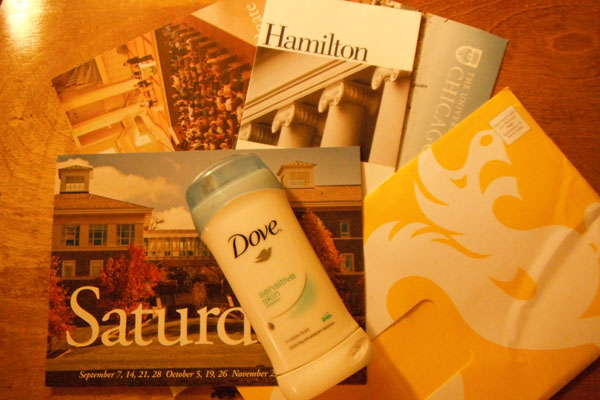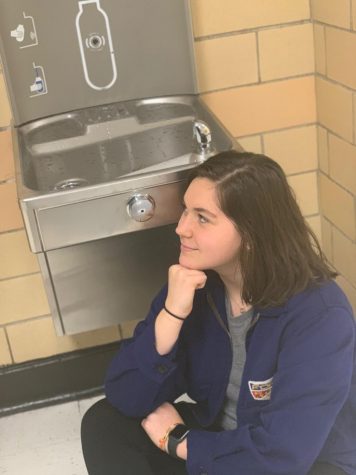For What It’s Worth: Why college mail doesn’t stink

Photo Illustration by Kate Alaks
What does this stack of letters and deoderat have to do with each other? Economics!
September 3, 2013
College. It’s looming, and you know it, and it’s one of the biggest decisions of your life.
Deodorant. A routine product that (hopefully) everyone in school uses.
These are completely different concepts, with completely different purposes, and yet, in some aspects, they are not so separate.
Let me back up to say that, yes, I’m starting the year out with a blog. If you don’t recognize me, I am the wild economist running about within the school who compulsively writes about what she finds. This blog entry might seem a little different than last year’s, in terms of explanations and so on, but that’s only to be expected. I hope it’s still just as riveting to those of you who found it so last year, and more so to anyone else.
Now then, back to college. I’m a senior this year, and am therefore inundated by letters, emails, and phone calls from colleges. If you’re a senior who happened to check the box one fateful day of state testing that said, “Yes, the College Board can send my information to colleges,” I highly suspect you’re in the same boat. Best of luck.
But that’s not all. You’ve probably also been buried under questions from friends, teachers, and family members, asking where you’re going, and what you’re studying, and if you’ve started applying yet. Since the time we are freshmen, and perhaps even before that, college is ingrained into our minds as a vitally important, life-changing choice, that somehow we’re supposed to make while we’re in the midst of being teenagers.
It’s that tremendous amount of buildup that obscures the relatively simple fact that all the mail we’re receiving is just… advertising.
Maybe you already figured this out, but for me the epiphany came recently, while I was sorting through the box of accumulated mail looking for things that I could definitely throw out. I realized that, without reading more than a word or two on the form letters, I could tell which college had sent it. I knew that “Get Outside” meant Eckerd College, and “What’s your passion?” with a large question mark meant Champlain College. I know what the Drexel dragon looks like by a glance. I could distinguish the school colors and the fonts, and the aerial photographs of the campuses, even ones I have no interest in. And I thought wait a minute… when did this happen?
The truth is that the letters and postcards and packets of detailed information are all advertisements. All those beautiful trees and happy people don’t mean anything, really, any more than the beautiful unscented people you might see beaming widely in a deodorant ad. Just because they’re smiling for the camera, does that mean the deodorant works? The answer is no. It might very well work, but unless you have specific information- you’ve tried it already, or perhaps have heard an unbiased opinion from someone who has- you can’t tell from the ads.
Similarly, just because students are smiling and statistics are showing class sizes of such-and-such and prices of this-and-that, their purpose is simply to get you to go to their college, or apply, or at least inquire further. The fact that they’re coming from colleges doesn’t actually make them any more truthful or important or believable.
However, they seem to be all of that at least for me. Even though I generally consider myself to be fairly insusceptible to advertising, I was still storing these form letters like they were the things that would actually foretell my future.
Why? Because college has been ingrained in my brain as a huge, dramatic, life-changing event; because when the letters started coming I could probably list a maximum of ten colleges that I knew existed, and because they do seem special. When I got my first few, it was really exciting. This college wants me to go there! Oh my gosh, college! I wonder if this is the college I’m going to!
That golden haze of glory might have diminished about the hundredth identical postcard or so, but somehow it took even longer to sink in that the letters were advertisements.
This is, however, not a trashing of college letters. Even though the form letters might be repetitive and not tell you anything, and even though the postcards might tell you nothing, and even though colleges you have no interest in visiting continue to send you what seems like millions of pieces of mail, and even though those obscenely large booklets tend to collect in corners, they can actually be helpful. They give you an idea of what’s out there, beyond what friends and family and the internet might point you to. Some of the best colleges I’ve found I first discovered through their mail.
In addition, sending out mail makes sense for colleges. Like deodorant, colleges are rather monopolistically competitive. (Yay, we’re finally getting to economics concepts!) Monopolistic competition is when different companies are selling a similar product, that is nevertheless not identical. Deodorant would be an example of this (have you even walked down the aisle and seen the ten different brands?), and another example would be shoes. Each different brand is more or less the same, but with enough differences that the companies can set their own prices, within limits.
The interesting thing about monopolistic competition is that even though the companies can set their own prices just like a monopoly, they are not monopolies. It’s not impossible to create, say, a new brand of deodorant, so there are lots of different products to choose from. And if business is successful- more people start hoarding deodorant just in case- more companies will think it’s a good idea to start up. Therefore, monopolistically competitive companies don’t get the huge profits monopolies do. (Deodorant tycoons, anyone? I didn’t think so).
This can apply to colleges too. Each campus is very different, with diverse offerings, and colleges will open or close depending on how many people are going to college in general. They are monopolistically competitive.
And, like I mentioned, a key factor of monopolistic competition is advertising. Since there are so many colleges to choose from, each one has to convince you that theirs is the best fit for you. And if you don’t know it exists, well, that probably won’t happen.
All right, I’ve covered a lot. You’re probably going to want me to give you some wise advice about college searching, because I must know what I’m talking about. Hmmmmm. About that…
Here’s what I can say. It was incredibly helpful for me to look at college letters as exactly what they were- advertisements- and treat them as such. I can’t just stare at them all and expect something amazing to happen. I have to go searching on my own. Visiting colleges, or college websites. Doing online searches for colleges that are near to where I might be vacationing just to see if there’s something convenient. Using college search programs if they allow you to search for what you want. (Personally, I have not had much luck with them.)
That said, I wish you the best of luck however you go about your college search. In the meantime, I guess I should get started on those applications….


